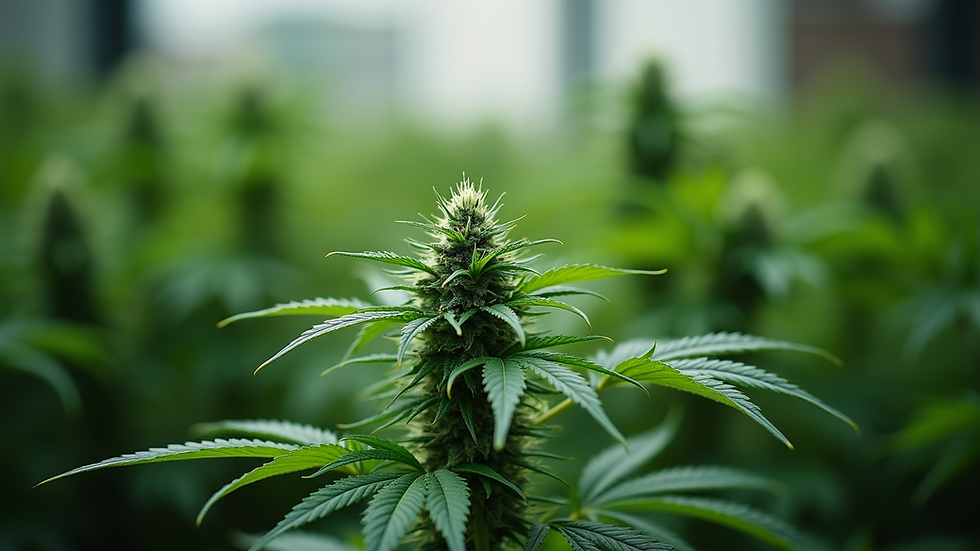How Federal Laws Shape the Cannabis Industry
- Andrew Mann
- Aug 7, 2025
- 3 min read
The cannabis industry in the United States is evolving rapidly, but it remains heavily influenced by federal laws. These laws create a complex legal landscape that affects everything from cultivation and distribution to research and banking. Understanding how federal regulations shape the cannabis market is essential for businesses, consumers, and policymakers alike.
The Role of Federal Cannabis Laws
Federal cannabis laws have historically classified cannabis as a Schedule I controlled substance under the Controlled Substances Act (CSA). This classification means cannabis is considered to have a high potential for abuse and no accepted medical use, which has significant implications:
Legal conflicts: Many states have legalized cannabis for medical or recreational use, but federal law still prohibits it. This creates a patchwork of regulations that businesses must navigate.
Banking challenges: Because cannabis remains federally illegal, many banks refuse to work with cannabis companies, forcing businesses to operate largely in cash.
Research restrictions: Federal restrictions limit scientific research on cannabis, slowing progress in understanding its medical benefits and risks.
Despite these challenges, recent legislative changes and court rulings have started to reshape the federal stance on cannabis.

How State Cannabis Laws Interact with Federal Regulations
State cannabis laws vary widely, with some states allowing recreational use, others permitting only medical use, and some maintaining full prohibition. This variation creates a complex environment for cannabis businesses:
Compliance complexity: Businesses must comply with both state and federal laws, which can sometimes conflict. For example, a product legal in one state may be illegal under federal law.
Interstate commerce limitations: Federal law prohibits the transportation of cannabis across state lines, even between states where it is legal. This limits market expansion and supply chain efficiency.
Taxation issues: Under IRS Code Section 280E, cannabis businesses cannot deduct many normal business expenses because of federal illegality, leading to higher tax burdens.
Understanding these interactions is crucial for anyone involved in the cannabis industry.

Is the farm bill legal for THC?
The 2018 Farm Bill marked a significant shift in federal cannabis policy by legalizing hemp and hemp-derived products. Hemp is defined as cannabis with less than 0.3% THC by dry weight. This distinction has important implications:
Hemp vs. marijuana: While marijuana remains federally illegal, hemp and its derivatives, including CBD, are legal under the Farm Bill.
Market growth: The Farm Bill opened the door for a booming hemp industry, including products like CBD oils, textiles, and food additives.
Regulatory challenges: Despite legalization, the FDA still regulates hemp-derived products, especially those intended for ingestion or therapeutic use.
For more detailed insights on this topic, you can explore the farm bill thc discussion.

Federal Laws Impacting Cannabis Banking and Finance
One of the biggest hurdles for the cannabis industry is access to banking services. Because cannabis is federally illegal, many financial institutions avoid working with cannabis businesses. This creates several issues:
Cash-only operations: Without access to banks, many cannabis businesses operate in cash, increasing risks of theft and complicating payroll and taxes.
Limited investment: Federal restrictions deter many investors, limiting capital availability for cannabis startups.
Legislative efforts: Bills like the SAFE Banking Act aim to provide legal protections for banks serving cannabis businesses, but federal approval is still pending.
Navigating these financial challenges requires careful planning and legal guidance.
The Future of Federal Cannabis Legislation
The cannabis industry is at a crossroads, with growing public support for legalization and increasing pressure on lawmakers to reform federal laws. Potential future developments include:
Rescheduling or descheduling cannabis: Changing cannabis’s classification under the CSA could remove many legal barriers.
Federal legalization: Comprehensive federal legalization would unify regulations, improve banking access, and boost research.
Expanded hemp regulations: Further clarifications on hemp and THC limits could stabilize the market for hemp-derived products.
Businesses and consumers should stay informed about legislative changes to adapt and thrive in this evolving landscape.
Understanding how federal cannabis laws shape the industry helps stakeholders make informed decisions. While challenges remain, ongoing legal reforms offer promising opportunities for growth and innovation. Staying updated and compliant is key to success in this dynamic market.



Comments